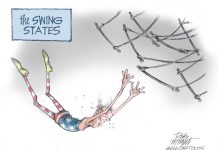Indianapolis Business Journal
Call us jaded. We’ve seen dozens of recommendations over the years for boosting the state’s workforce readiness and preparing Indiana for the next generation of jobs. Sometimes they come from new governors or at the whim of lawmakers or because of a perceived change in the economy or Indiana’s standing among other states.
And over the years, there have been many great ideas — some in practice, others still on a shelf.
But included in almost every workforce plan of the last few decades has been layers of bureaucracy — new agencies, commissions, panels at the state and local level.
So we were delighted to see that a new set of 30 recommendations from the Governor’s Workforce Cabinet is largely free of bureaucracy.
Instead, the recommendations are practical, actionable and refreshingly feasible.
They are divided into three areas: helping employers find skilled workers, removing barriers for workers and preparing future skilled workers. They were developed by a panel appointed by Gov. Eric Holcomb that includes business executives, educators, government officials and social service leaders.
Ryan Kitchell, a former hospital executive and previous state Office of Management and Budget director, chaired the panel and worked with the cabinet’s new executive director, Whitney Ertel, on the recommendations. Both came on board the cabinet last spring, just in time to help Indiana rethink its workforce approach post-pandemic.
The governor, Ertel said, was seeking “new energy, a renewed focus and a very, very accelerated approach” to bolstering the state’s workforce readiness. And she said the recommendations focus heavily on increasing preparedness for STEM jobs as well as helping every worker move to the next level of education or advancement, regardless of where they are starting.
“This is about investing in the workforce like we’re investing in other parts of the economy, like infrastructure,” Kitchell said.
To that end, we love the recommendations that focus on helping workers and employers navigate the complex systems for access to training programs, educational opportunities and more. Too often, those efforts have been focused more on people who are unemployed or companies negotiating incentive packages and less on employed workers who want to do more and existing employers looking to expand.
The panel’s recommendations call for an Indiana Talent Agency — which would be less a headhunter and more like the Indiana Economic Development Corp., but helping to develop recruiting and training strategies for all Indiana companies.
We also appreciate efforts to give students more access to employment experts while they’re in school, rather than putting all the burden for career planning on guidance counselors, and rethinking the credentials that go into a high school degree — not to make them more stringent but to make them more flexible.
There are more recommendations worth pursuing (and a few we might not totally agree with). We hope the governor’s office and the legislature (and in one case, Congress) will take them seriously and act accordingly.





